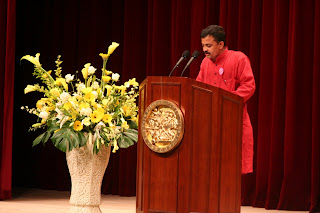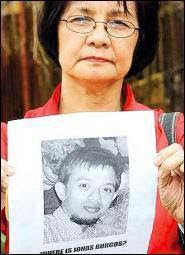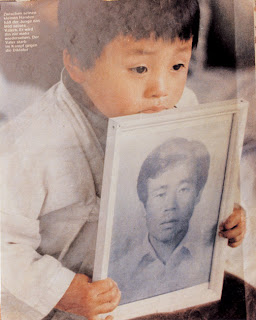
Distinguished President of the May 18 Memorial Foundation Mr. Lee, Hong-Gil, distinguished members of the Board of Directors, distinguished guests, dear people of Gwangju:
It is a great and revolutionary honour for me and my colleagues at the People’s Vigilance Committee on Human Rights (PVCHR) to receive the Gwangju Prize for Human Rights for the fight for the dignity of the poor and “untouchables” of India. Further, as a co-recipient with Ms Irom Sharmila Chanu, an icon of resistance against the draconian state law of Armed Forces Special Powers Act, the honour is manifolds.
Greetings and thanks to May 18 memorial foundation for reorganization of most wretchedly treated people in the world, the Dalits of India, known once as ‘untouchables’. The silence imposed by draconian suppression sanctified by religious rituals of the Upper Caste was such that the outside world knew little about this colossal cruelty. Justice V.R.Krishna Iyer, former Judge, Supreme Court of India described the plight of the Dalits in the following words, I quote, ” Courts to them are alien, laws their enemy and human justice their despair.”
The caste system continues to determine political, social, and economic life of a billion people in South Asia. The caste system, straddling across the scrawny shoulders of the Untouchables, is like that Old man in Tolstoy’s story, who has all the sympathy for the poor bearer and would like to do anything but to get off his shoulder. The most significant aspect of caste is its ability to resurface without a trace of remorse on the part of the perpetrator. It is like that chemical addiction which once had makes you vulnerable to its guiles forever.
Modern India embarked on the road to freedom with a resolute face to deliver social justice along with dignity to its millions of ever enslaved, downtrodden, poor and Dalits. In 60 years little has changed. The atrocities against Dalits have taken more blatant and bizarre form and in some parts of my country, shake the confidence in humanity in the fact that it has the ability to call itself Civilized! In the past, we are told, that if anyone from the lower caste breached the unwritten law of caste hierarchy, the person would be beaten up in public. Now the person will be shot dead and the village burnt down and the women raped. A bride groom daring to ride a horse during his marriage, an enterprising peasant digging a well in his land, or if, a boy falls in love with a girl – do you kill them. Yet, if they belong to the dalit caste they are killed. We still say that there is rule of law in India!
Dalits have an appalling rate of literacy. When the national average touches 67%, among the dalits it is a mere 32%. And if at all you are a woman from that community, it is still less at 23%. Only 6% dalits own land. Most of them labour in someone else’ field or migrate to cities to lose their identity.
The fight for Dalit rights in India has had a chequered history. At every turn they have been betrayed and let down by their own and the political masters. Mainstream politics in India has only recently and reluctantly acknowledged the space for dalits. Till now the main thrust of political intervention has been in the shape of reservations in government posts without adequately making them empowered to get a rightful and dignified place in society.
There is considerable amount of conspiracy, nationwide by Hindu fascist forces, against the lower caste. This was evident from the nationwide spell of destruction of statues of Dr. B. R. Ambedkar. It is an irony that he is the father of the Indian Constitution and also a dalit who fought his way in the caste ridden society. The destruction of Amebkar statue happened in several places in India. In one such incident, which happened in Piyari village of Uttar Pradesh, the people from the lower caste tried to fight against those who came to destroy the statue. To their surprise they found that among those who came to destroy the statue there were police officers. The people from the Dalit caste faced them with sticks and tried in vain to prevent the destruction. The result was that the local police registered a case and a counter case. One against those who came to destroy the statue and one against those who tried to prevent the destruction. Of course when the police registered the case, they conveniently avoided those from the police department. The case was filed in a local court. However, soon to the surprise of the upper caste they found that the judge was from a lower caste, which is a rarity. Without any notice to anyone involved in the case, the case was soon transferred to another court.
To transfer the case it needs to be done with the sanction of a superior court. So it means that the superior courts also in a way connived with the upper caste. Nothing better could be expected from a place where in the recent past, a District Judge, before occupying the chair used by his predecessor, who happened to be from a lower caste, conducted some religious ceremonies in court to purify the chair and washed the chair with the water from the river Ganga, which is believed to purify all the sins.
When a person from the upper caste commits a crime, whatever it may be, after trial the person who committed the crime is punished. However, when it comes to the lower caste the entire community is punished. The punishment is not by the court, but by members from the upper caste and the crime is not theft or murder. It could be anything from polluting the village well by draining water from it or washing in the pond thereby polluting the pond or even walking in the road while an upper caste was using the same road. The punishment is instant and often carried out by gangs of upper caste members by burning down the houses of the lower caste, beating the residents and often molesting or raping their women in public. In one such incident which happened in Narkati village of Kaimur Range of UP when a similar upper caste police raided the village a five year old girl cried out loud since she was afraid of strangers. Her name is Anjali. These people who saw her crying did not spare her. She was also beaten up by the policemen. A complaint was lodged with the NHRC. Indian People’s tribunal headed by Justice Sukumaran was appointed. But no action has yet been taken. There is no law and there is no rule of law for these people.
The current trend is to charge anyone and everyone alleging that the person is a Naxalite. Even children aged from 9 are charged with offences allegedly of having involved in Naxalite activity. This happens with the knowledge of the court. Currently the Ram Nagar juvenile court has ordered detention of nine such children.
Indian society still remains in a semi feudal and semi capitalistic mode of production relation. Caste system serves this mode perfectly. The pyramid of Indian society remains aloft on the shoulders of these millions of dalits who forego their human rights so that some people can say India is shining.
However two thousands and eight hundred years ago, lord Budha took up the challenge to end the caste system. In the modern times, Bhakti movement gave birth to Kabir, Raidas later Periyar, Savitri Bai Phule to Jyoti Ba Phule and recently Dr. Bhimrao Ambedker, who took the courage to shake it.
Lastly the movement of Marathwada is the base of Dalit movement in India, which consisted of feminist, socialist and progressive revolution; this caused mortal shocks to caste system, patriarchy, feudal Bramhinism.
On the other hand, from Marathwada itself, RSS germinated. The RSS chief organizer Guru Golwalker, who held Hitler in very high esteem, described India to be a purely Hindu Country and Muslims second class citizens.
The danger faced by the caste dictatorship created a new link in communal Hinduism fascism and imperialism. Till all progressive powers joined hand to crush Brahminism from its roots, till then Manu’s patriarchal dictatorship would persist and flourish. Although very little can be attained so quickly such time communal fascism not get crushed.
The typical danger is from Indian Hindu communal fascism to the entire globe is that every fifth person of the world is Indian.
PVCHR is fighting back the caste system of India through participatory activism through “local thinking and local-global action”. Now Dalit is un-censoring themselves and claiming their own voice in a sustained way, PVCHR has aimed at voicing the disgust of the silent millions not through the bayonet, but by reinstituting their faith in the system of democracy; by fighting continuously with the state to assert their rights.
Dalit associated with PVCHR ask,”We ask, "Is the earth alone?" Don't you have to go to the earthworm, busy making earth fertile, and ask before taking any important decision!
Who knows if the ants are more concerned about the earth’s future than you?
I am worth an earthworm. For you I am only an ant to be crushed.
My human rights puny before your demon rights
We may be insignificant come on.
Agreed let our claim over the earth is no way less than yours.”
It is time to revive the far-sightedness, the vast imagination and great sensitivity of the people who are remembered on the May 18. It is time that we re-articulate their aspiration in global terms and it is time to grasp the possibilities of that moment. The folk-school spirit of the May 18 Gwangju uprising has become a light of hope to us.
The wind of unification that is blowing in Korea is taking place in this climate. It is with subdued excitement that we on the outside are watching.
I thank the May 18 Memorial Foundation in Gwangju for presenting me with the Gwangju Prize for Human Rights, which I humbly accept and which I am happy to announce will be used to spread the folk-school approach towards the promotion of human rights and democracy.
Thank you.


























